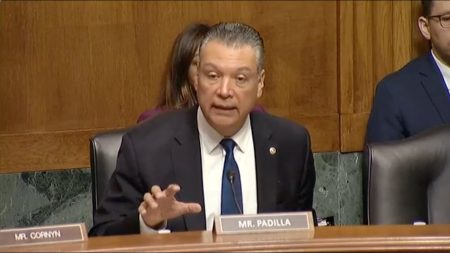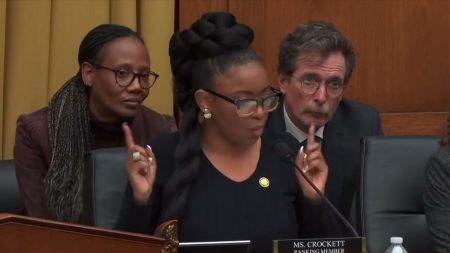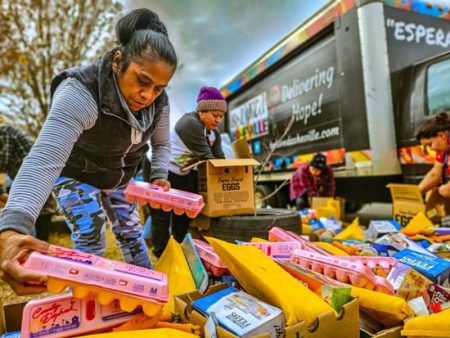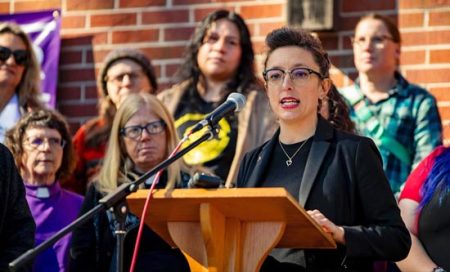APD Sgt. Diana Loveland
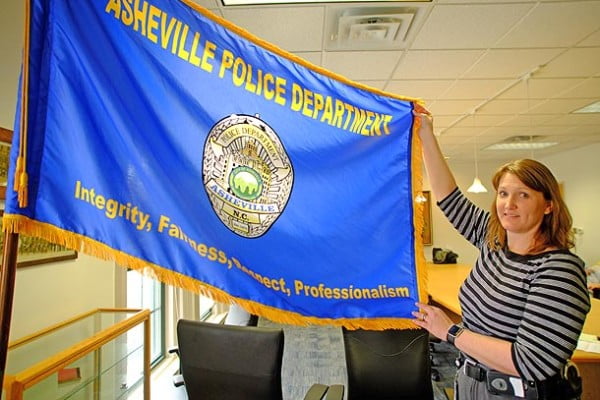
- Age: 38
- Early Years: New Bern, NC
- College: Western Carolina University
- Asheville Resident: 19 years
- Rank: Sergeant
- Years/Status with APD: 18 years; promoted to sergeant in 2014
Q: I would like to know why you decided to go into police work.
Loveland: I know the typical answer is “to make a difference.” So I kind of come from a background where police wasn’t feared but it was a fearful respect … you kind of didn’t look at them; you’d stay in your car and look straight ahead so you didn’t see them or they didn’t see you kind of atmosphere. And so there was a (time) as a child where I saw some interaction … probably the biggest memory that I have. I come from a single parent home and so my mom had me at a babysitter’s one evening and it was in a trailer park, so there was a lot of people around and there was this big fight outside between two guys, and one guy kicked the other guy – I refer to it as a football kick – kicked the other guy in the head. And so an ambulance was called and police were called and there was a whole lot of interaction going on. And I was just kind of enthralled with what all took place. (In 4th grade.) That was the first time I’d ever actually seen police interacting with people, and so that’s where I first picked up the notion that maybe that was something I wanted to do. Years later my mom was in the hospital and we saw the guy that got hit in the head was still in the hospital – he had a traumatic brain injury and was still in a vegetable status. So seeing how that one incident kind of unfolded and ended up kind of shook me a little bit, and that’s kind of when I first wanted to be in law enforcement … because he had nobody advocating for him that I knew of as a child at the time. So that’s kind of why.
Q: You mentioned college. Did you go straight towards police work?
Loveland: No, my mom was really against me going into police work. So I started with a nursing goal, but after my first semester I called and told her I was switching to criminal justice. She wasn’t happy, but she’s come to love it. So no, it was a big argument at the house – not that she didn’t like police but she had that “fear” of police officers as well. So coming from that aspect and knowing what police officers go through in her mindset, she didn’t want her daughter to go through that.
Q: One thing I didn’t ask you was your ethnic heritage….
Loveland: Kind of a hodgepodge.

Q: So what I’ll do is change this question a little bit — how do you think your background affects your police work now?
Loveland: Well, like I said I came from a single-parent home. My dad was military so he wasn’t around very often. He lived in other states. And my mom worked a lot of odd jobs. She was a young mother; she was 19 when she had me so after her divorce with my dad she kind of went through a second childhood where she would go out and be with friends and stuff like that. I had a great upbringing – don’t get me wrong – but I got what I needed, not what I wanted when I was growing up. So knowing that – I had a babysitter one time when I was in third or fourth grade … my mom worked the night shift at this particular time. When I went out, they had cocaine on the picture frame and were in lines, and so – I’d seen drugs before ever going to middle school. So when I told my mom she was like “Oh, it must have been BC powder” and I’m like nope, it was NOT BC powder. But I grew up kind of scared of the police. So I try to kind of consider that, in growing up how I was and how my mom would tell me “Don’t look at them and they won’t pull us over” kind of thing. I try to consider that – that somebody else might have had that same thing growing up that I had, especially kids. So there’ve been several instances where I’ve waved to a child and the parent get mad at that child because they spoke back. I feel horrible because I’m the one that spoke first and now they’re in trouble because they spoke back. So I don’t ever want children to be afraid of us, because we’re who they need to be able to come to when they’re in trouble or hurt. So looking back at my own background growing up, that’s what I consider.
Q: What would you say have been your most fulfilling experiences in your chosen profession?
Loveland: There’ve been several. Probably the thing that sticks out the most is there are times we serve commitment papers, papers that someone has filed at the clerk’s office or the magistrate that mandate that the person goes and gets an evaluation by a doctor. And we have no control over those papers, we just have to serve them and transport the individual to the nearest hospital. And at the time St. Joseph’s was still open and that’s where we took these individuals. And the time frame that you spent, you had to wait until a room opened, so they were in your custody until the hospital officially accepted them. And so I spent about 7 or 8 hours with this one lady, and she was a drug addict, homeless on the street, and her family as a last-ditch effort took out these commitment papers on her. And so just spending the 7 hours, we talked quite a bit. And so I guess two years had gone by and I had not seen this individual since that moment and at Bele Cher I was walking around downtown and she comes up and she’s like, “Officer Love…., I’m so glad to see you – I’ve been clean and I just want to thank you for spending that time and talking to me.” And I like was overwhelmed with emotion and tears because I’d never seen what comes out on the other side. So it was really emotional for me to experience that and have that come back, someone come back and say that. That’s got to be one of the things that stick out.
One more. I worked as a detective for a while and I worked as a juvenile detective where I had a lot of juvenile victims. And so those cases can be very difficult at times, and so being able to help them through probably the most difficult time of their entire life at such a young age, I don’t know, kind of gives you purpose.
Q: Tell me some more about anything you remember about police when you were younger?
Loveland: When I was a kid? There was this weird incident … I worked at Sonic and I’d just gotten my first car (which wasn’t new at all – 1985 Cadillac Cimarron) and so as soon as I pulled out of the Sonic driveway I got pulled over and I still had my 30-day tag and it had just expired like that day, and so technically I had until tomorrow…. No idea what I did to get pulled over and then one police officer pulled up, another … there were like four police officers and it was raining a little bit and I thought maybe my (paper) tag was wet so maybe they just couldn’t see the expiration date. So they still hadn’t even asked for my driver’s license yet. (She explained Dad was picking up tag. Got to city/county line and one officer dropped off and county car picked up and they followed her to her driveway; stepfather there with tag. They said “OK, thank you” and leave.”) And they never asked for my driver’s license, and they never said why they pulled me over … so I thought one day maybe I’d figure it out but no, never. Nothing that I was taught in the police academy. I have no idea if I … looked like a suspect … still in my Sonic outfit, even had roller skates in the backseat, and I have no idea why I was pulled over. Talk about heart flutter….
And that’s part of – I just kind of wanted to see why police officers do what they do. Why was my mom – why did she have this fear of officers? And so when I went through the academy, I realized that, I mean there really was no reason to have this fear. But people’s perception sometimes are more fearful than reality. I know mine was growing up.
Q: Did you have any nice cop experiences as a kid?
Loveland: Yes, with a DARE officer. Fifth grade is when I went through DARE, and there was one DARE officer for the whole school — Drug Abuse Resistance Education; not as common in schools anymore. They say they don’t do DARE (now) because it’s been proven not to work. However, that is why I’ve never tried drugs. So growing up, of course marijuana was quite common growing up and I saw quite a bit of it – cousins, friends. And everybody knew that I did not smoke marijuana so they never offered it. I think that was because of DARE. I went through the program and I did not win the essay, although I tried! But just his interaction and his openness of coming in and talking with us. You know he wasn’t the man that I thought he was. He was very nice. I wish I could remember his name. I remember what he looked like. He was very nice; he interacted with the kids very well. He was a positive influence with me, and that was probably the first time I’d had a one-to-one conversation with a cop.
Q: I think I want to back up; since you’ve been with APD for so long can you just trace what you’ve done?
Loveland: I started in BLET, which is Basic Law Enforcement Training, in January of 2000. And then of course went into the field training program after graduation when I was sworn, and that’s an average of three months. And then from there I worked in the West District (West Asheville) —they had a days, evenings, and nights shift and I worked the evening shift. I worked that for several years (4:30 to 3:30; and then it changed to 5 to 3). And then I was transferred to South District, which is the Skyland area, and I worked that for several years, briefly on days and then we went to 12-hour shift and I worked nights, and I worked 7 to 7…. And from there I went into the detective office. I worked in the detective office for almost six years…of course I worked general assignment, juvenile sexual assault, motor vehicle theft for a short time, fraud, I was on a crisis negotiation team for almost 10 years. I was a field training officer before I went into the detective’s office, and when I came out of the detective’s office I was asked to go into the property room. That was right after the property room incident, and they wanted sworn officers in there, and no one was to ever be alone so they had quite a few of us in there. That was very brief. I think I was there less than three months before they went a different direction and hired some non-sworn people to come in. And so then I went back out to West Asheville working days, and then from there I got promoted. And so I’ve been bounced around based upon need, and now I’m currently assigned to the detectives division, I’m a sergeant over general assignment. There’s two of us over general assignment.
Q: How has your time with APD changed your opinion of police work?
Loveland: I realized quickly that it’s just not about going in and arresting people and writing tickets. There’s a lot of calls that we are a mediator. I will tell my trainees that we wear multiple hats, and you have to determine on your way to a call what hat you are going to wear. Are you going to be a social worker, a mediator, are you going to have to be a law enforcement officer or are you going to be a reporter — are you going to report an incident that happened. So there’s multiple things that you have to do. And you don’t really know until you get there – sometimes it changes quickly. So when I first came into police work I thought it was pretty straightforward, and quickly learned that it’s not that way.
Q: What do you feel is your responsibility to the larger community as a member of the police force?
Loveland: Anytime somebody calls, they’re usually calling because something bad has happened. They don’t call because they’re having a good day. Usually it’s a bad day and sometimes it’s the worst day that they’ve ever had or experienced. So number one to realize that even though I’ve gone to 15 calls today that have all been different, this is this person’s most important thing that day. And sometimes we get cynical and we forget that, and we try to put perspective on well, we just went to this domestic where this woman was beat pretty badly in front of her children and had to be hospitalized, and the kids see Dad going to jail and Mom going to the hospital and a family member or a friend is coming to take care of them – or DSS is having to be called to take care of them. And then go in to someone who had their laptop stolen from the front seat of their car that they left, you know, in plain view. And that’s very important to that person. But to that officer where they just came from, they’re going to try to remember to have perspective of what they’ve just dealt with and what this new victim has dealt with, because they have no idea. This is their (the victim’s) whole world and this is what they’re dealing with. So I think it’s the responsibility to the community to realize that this is the most important to them, and not to be cynical; to have self-care and an outlet to where you don’t lose sight of that. So I think that’s an officer’s responsibility. Does that make sense?
Q: What do you see as the role of the larger community in the success of APD?
Loveland: I think it’s important – just a multifaceted thing here first because I can’t tell you how many times I’ve been at lunch or dealing with something else and somebody will tell their child, “Now you better behave or I’m going to have that officer arrest you.” Or “You better eat your vegetables or I’m going to have that officer arrest you.” I think it’s important that we don’t put false fear into children’s perception of police officers. Because that is who – if your child is lost, and they’re lost because of something that they feel is their responsibility because they’ve done something wrong, you don’t want them to be fearful in going to a police officer and asking for help. So to say that we would arrest them because of something they’re not eating for lunch or if they don’t behave, I think that we need to be cognizant or what that does to children, because they don’t know you’re kidding. And you may not be kidding – I don’t know (laughs). You may really want that to happen. But I think community needs to be aware that that’s an issue.
I also think that for community to realize that we are people too. That it’s OK to have a conversation with us. Growing up, I would never have said, “Hey, how’s your day going?” and open that dialogue with a police officer, because you don’t talk to them unless they talk to you. So having that open dialogue with police officers … it’s kind of awkward to go up to someone that you know might have a negative perception of you and say, “Hey, I’m just here to see if you need anything” or, you know, “How are things going in your neighborhood?” But if you are open to that as well, I know in my past going into some of the neighborhoods where law enforcement does have a negative view from the residents, it’s difficult to sometimes start that conversation. And when they’re not open to the conversation either, it’s a lot more difficult. So an example I can give is we were there in one of the housing developments and the kids were outside playing and so we were walking around trying to engage with the community and the kids, and a couple of the parents came out and made their kids go inside because we were outside with them. And then, another kid fell down so I gave them a band aid but then she got in trouble because I gave her a band aid. So to realize that we’re not there always on a negative basis. We want that positive interaction.
Q: I’m going to ask you a question you don’t have to answer … this just makes me curious. Given what the perception is of the attitude in the black community, what do you see as a way to break through that?
Loveland: I think it’s going to take both sides coming together and kind of leaving behind negative past experiences. And I don’t mean to say that like you should never – because I remember mine and how they shaped me. So I don’t mean it like that. I mean you shouldn’t hold that against every person you see. I am one officer, not an entire department. Just like this incident that’s in the news now, that was one officer, not an entire department. So while I don’t think you should ever discount anything that you’ve experienced, I don’t want that to be misconstrued – I just think that you should not treat every experience like it’s going to be that way again. Does that make any sense? ….. And that can be difficult, just speaking of my own experiences.
Q: Are there particular steps that you would encourage APD and/or the Asheville pubic to take that might improve policing in Asheville, and that might include if there are things that you could see, that could be training for police department members but anything you could think of that would help the community….
Loveland: That’s a tough one. I know that we have community meetings and community outreach, for example Coffee With a Cop, where we go into each area and try to engage conversation with neighbors and the community—that particular community. And I have been to a couple where only two people have shown up. And so we never want those conversations to be “You do this, you do this, you do this” … more of an engagement conversation, you know, here’s some examples of things to do. We really want to know about the concerns that the neighbors have and that the public has. But one, having people from the community actually show up to these events—it’s a way to express issues that you’re having, good and bad, with your neighborhood.
Steps to take to improve…. We’re always training. Like I went to BLET 18 years ago now, and every year we have training. And training has evolved in those 18 years. We’re always trying to do things better and more effectively. So I think any police agency needs to realize just because it worked 10 years ago doesn’t mean it’s going to work today. And I truly feel like, you know I’ve been around through four chiefs, and I truly feel we are finally at a point where just because it’s something we always did doesn’t mean it’s something we’re always going to do. And we’re not going to keep doing it … it might have failed 10 times so OK, that’s failed, let’s move forward and try something different. With the de-escalation training, and some force-on-force type training, I think it’s really moved us forward as an agency. I really do. I think it’s been extremely helpful. As a crisis negotiator going through de-escalations, I even thought, “I’m a crisis negotiator, what do I need de-escalation training for?” But I got a lot out of it, and I had been on the crisis negotiation team for quite a while. And so being open to that change – ‘cause we kind of get stuck in a rut sometimes. So being open to the changes of training and things like that.
Q: Can you explain what de-escalation training is?
Loveland: It’s trying to use words and techniques to bring a situation in crisis from way up high, and bringing it back down to a level to where you can communicate to work out your problem, versus force-on-force, realizing that sometimes you’re not always going to be able to de-escalate a situation, and in those times force is met with force. And force never looks pretty. So being able to determine, OK, this is something that de-escalation is going to work with, and also being able to determine that you know what – we’re not at that de-escalation point, we’re going to have to use some force and then try to de-escalate. So I think that that’s important to have both, because just because you start with a force situation doesn’t mean it can’t de-escalate and the force end. Does that make sense?
So sometimes force has to be met with force. And it doesn’t mean that afterwards, when that weapon is no longer in play, that de-escalation doesn’t come back in.
And I think for the community to also go to – I think the Police Department and the Sheriff’s Department both have Citizens Police Academies and that is an amazing way to kind of learn what policing is and why it’s done the way it is. So I always like to encourage people, number one, to be the change you want to be. And I tell my kids this. If you don’t like what you see, then be the change you want to see – don’t perpetuate it. But if you can’t be a law enforcement officer, then go to one of these Citizens Police Academies and get educated as to what police officers do and why they do it, and what the different divisions of the department are. It’s open to everyone, and they also have the opportunity to do ride-along with an officer out on the road, so they can see firsthand what information an officer is given on the way to a scene that they have to work with, and then what actually is going on. Sometimes what you’re give on the way to a scene is completely different than what is going on at the scene. And so how they work through the limited information to gain all the details of that situation. It’s eye-opening just to be able to see that. I did not have a clue prior to going to classes on it in college.
That’s actually a question that they ask jury members is do you watch crime shows and do you believe that those are true. Because they call this the CIS effect.
Or this is a problem that we see in the detectives’ office, is that a victim will think that a detective only is working on their case. When they actually, in reality, carry a caseload of around 25 to 30. So, it’s the most important thing in the victim’s life, but in the detective’s life they have to balance it with what other cases they’re working. So having knowledge of that and being able to go to courses offered like that is truly eye-opening for someone that realizes “Oh you don’t work with one case at a time?”
Q: OK, you’ve made me add another question here. Are there other misperceptions that you’ve encountered?
Loveland: Here’s something that … I do some children’s programs, I go and I read sometimes, have a question-and-answer type scenario, and it never fails that someone will say my dad, my mom, my aunt, my uncle, somebody got arrested and they’re in jail. Cops came and took my dad away. And of course other kids are like oh, you’re dad’s a bad man. And so I ask them – have you ever been in time out? And the kids are like yeah, I’ve been in time out. And I’m like well, are you a bad person? You just did something you weren’t supposed to do. Jail is an adult time-out that … I can’t make your dad go sit in his room, but if he’s done something that he wasn’t supposed to do then it’s very possible that a judge can put him in an adult time-out, which is jail. And that doesn’t make him a bad person. It just means they did something they weren’t supposed to do, and once they have sat in their time-out they’ll come out and they’re not a bad person just because of that one event. And I think it’s important for people to realize one incident should not define your entire life. ‘Cause we get stuck on that. We think everybody is bad. I know for my own family, that’s not true. And people that I deal with every day – I can’t tell you how many times I’ve taken someone to jail and they thanked me.
Q: Can you tell me about one of those times?
Loveland: There was an incident, guy had warrants, and I am not a very strong, physical-type person. My main tool is communication. So being able to talk to someone to bring them into handcuffs versus fighting someone into handcuffs—that’s what I’m gonna do. And so, waiting at the sally port door (court entrance for police and prisoner) for it to open to go in, there’s been several conversations about thank you for not putting the handcuffs on me in front of my kids. Thank you for …. I actually one time received a letter and a phone call thanking someone for taking them to jail for DWI. So while those instances are rare that you do have someone follow up with a thank you, that same person that I arrested for DWI—a year-and-a half later I was consoling her at the death of her child. Her baby died of SIDS. So we had to come in and ask the hard questions—you know, what happened—because every death is treated as a homicide until we have proof that it’s not. That’s how we have to work. And so my rapport with this individual on the road, arresting her for DWI, it was a dreadful arrest. She was not a happy drunk. She called, apologized, we had a great conversation afterwards, and then within a year-and-a-half I’m sitting in her house and her one-month-old baby is dead. And so now we’re having this conversation. So those times really do matter.
Q: Last question: Do you have any personal observations or comments regarding the role of a police officer in today’s society?
Loveland: I think I touched on this earlier – a police officer has so many different roles. It’s not just traffic enforcement. It’s not just going to calls for vehicle B&E’s and things like that. We have to be able to talk to a child and talk to someone that’s just murdered their wife—at the same time. So there’s a lot of different roles. Plus we have to go home and be husbands, wives, mothers and fathers. And go out in public with our kids, and wonder if there’s anybody going to be there that maybe didn’t have a good reaction to that DWI arrest. So there’s different roles that we play and that we go through in one day. So just trying to remain positive and realizing that not everybody is bad, and there are still good people in the world. Does that make sense?
And it’s important for law enforcement to know, too, that they are viewed in a different light. That’s something as a new officer I didn’t realize. I never carried a weapon off-duty…. I didn’t realize that people look at me in a different viewpoint all the time. So one thing that I try to stress to newer officers is don’t let the job and the negative of the job – and only seeing negative in people—let you forget that there is a positive aspect to a person. So having that outlet to where you can recharge as a human being as well, makes all the difference in the world on the longevity of your career. Because a lot of people get into the career and they don’t stay because they can’t find how to rejuvenate themselves and realize that humanity is actually good. We just see a lot of the bad.

